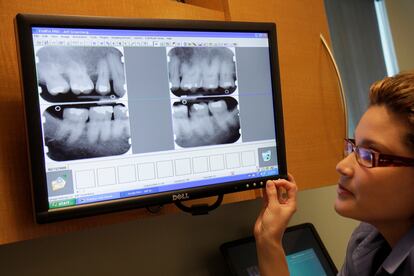Poor gum health increases risk of suffering from cancer, Alzheimer’s and more
Periodontitis, suffered by a large percentage of the world’s population, can affect many different organs beyond the mouth. Proper dental hygiene is essential to prevent it

Between eight and nine out of 10 people over 35 years of age have gum disease: either gingivitis or periodontitis. The latter is the main cause of tooth loss in adults, and according to the World Health Organization, it ranks as the sixth chronic pathology in the world, behind caries. And yet, many people do not know what it is. Therefore, it is fitting to start by explaining the differences between the two aforementioned ailments: while gingivitis is the inflammation of the gums, caused in most cases by bacteria, periodontitis also causes bone loss around the teeth.
It is surprising that so many people ignore what periodontitis is. First of all, it not only affects chewing function, due to the initial loss of posterior teeth, but it also worsens one’s aesthetic appearance. Its symptoms — recessions or loss of gum around the teeth and their displacement — compromise the smile and reduce self-esteem.
Scientific evidence, especially since the 1990s, confirms that patients with advanced periodontitis have a higher risk of suffering from other serious systemic diseases such as acute myocardial infarction, diabetes (as it makes it difficult to control it) or aspiration pneumonia. In pregnant women, it also increases the chances of having a premature birth. And the list has grown in recent times: associations with hypertension, Alzheimer’s and even some types of cancer have been found.
An aggravated inflammation
What is the reason for this pile of aftereffects? When a patient suffers from advanced periodontitis, their immune system is responding powerfully through inflammation to bacterial aggression; specifically, to the presence of anaerobic gram-negative bacteria in the gingival sulcus, the space between gum and tooth.
Those microorganisms, present in the oral bacterial biofilm, can colonize the tissues that make up the gum; that is where the exacerbated inflammatory response occurs. This natural reaction to the aggression has consequences, both in the mouth and in the rest of our body.
Locally, the invasion of bacteria and their toxins triggers an attraction of defense cells and proteins. This produces a deluge of powerful inflammatory mediators that destroy the collagen in the gum and bone, which deteriorates the teeth and their support.
Additionally, several mechanisms can affect other organs, but mainly two: first, the presence of the bacteria themselves and their toxins in the blood vessels, which damages their internal structures. Secondly, the circulation of inflammatory mediators through the blood, which stimulates the inflammation in the placenta, pancreas and more.
From diabetes to gastrointestinal cancer
Regarding diabetes, an advanced periodontitis increases insulin resistance, leading to a poor management of the disease. It also causes an increase in the levels of C-reactive protein (a marker of inflammation) and blood pressure, both of which indicate the risk of cardiovascular events.
Regarding the moderate association with Alzheimer’s, it becomes particularly relevant when the existence of Porphyromonas gingivalis (the main periodontitis bacterium) is detected in the brain. In addition, it has been observed that a high and continued presence of Fusobacterium nucleatum, another essential microorganism in the development and progression of this disease, can increase the risk of suffering from gastrointestinal cancer.
Basic hygiene measures
Now for the good news: periodontitis prevention is easy with a good oral hygiene routine. Brushing twice a day for two minutes to remove oral plaque bacteria is necessary — an electric toothbrush can be very helpful — as well as the use of dental tape and interdental brushes.
Of course, bacteria also need to be removed regularly in a dental clinic with sonic, ultrasonic or manual devices, and it is essential that a periodontist or dentist diagnose the health of your gums periodically.
Sign up for our weekly newsletter to get more English-language news coverage from EL PAÍS USA Edition
Tu suscripción se está usando en otro dispositivo
¿Quieres añadir otro usuario a tu suscripción?
Si continúas leyendo en este dispositivo, no se podrá leer en el otro.
FlechaTu suscripción se está usando en otro dispositivo y solo puedes acceder a EL PAÍS desde un dispositivo a la vez.
Si quieres compartir tu cuenta, cambia tu suscripción a la modalidad Premium, así podrás añadir otro usuario. Cada uno accederá con su propia cuenta de email, lo que os permitirá personalizar vuestra experiencia en EL PAÍS.
¿Tienes una suscripción de empresa? Accede aquí para contratar más cuentas.
En el caso de no saber quién está usando tu cuenta, te recomendamos cambiar tu contraseña aquí.
Si decides continuar compartiendo tu cuenta, este mensaje se mostrará en tu dispositivo y en el de la otra persona que está usando tu cuenta de forma indefinida, afectando a tu experiencia de lectura. Puedes consultar aquí los términos y condiciones de la suscripción digital.








































